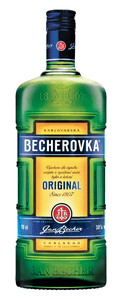Becherovka
Becherovka (Czech pronunciation: [ˈbɛxɛˌrofka] (![]()
 | |
| Type | Bitters |
|---|---|
| Country of origin | Karlovy Vary, Czech Republic |
| Introduced | 1807 |
| Alcohol by volume | 38% |
| Colour | Yellow |
| Website | http://www.becherovka.com |
Becherovka is often described as having a gingery or cinnamon flavor.[2] Its alcohol content is 38% ABV (76 proof),[1] and it is usually served chilled.
History
The inventor of Becher Bitter was Josef Vitus Becher (1769–1840) of Karlovy Vary. Apart from trading in spices and colonial goods in his shop, "Dům U Tří skřivanů" ("House of the Three Woodlarks"),[3] he also produced alcoholic beverages. In 1794, he rented a still-house and began to experiment with hard alcohol.
In 1805 Prince Maxmillian Friedrich von Plettenberg arrived in Karlovy Vary for his medical treatment, he was accompanied by his personal physician, Dr. Christian Frobrig from England. Frobrig with Josef Becher discussed the strength of herbs and the recipe for a new liqueur. Josef Becher tested this recipe for two years after which he started to sell this new "English Bitter" liqueur which was intended for the treatment of diseases of the stomach.
Josef married twice (his first wife died of pneumonia) and had a total of 16 children, though only five daughters and two sons outlived him. Josef's son, Johann (Jan) Nepomuk Becher, took over the still-house in 1838. He built a new factory and is considered as the founder of the company. Speaking approximately, his product was sold under the name of "Becher Carlsbad Bitter Liqueur" from the thirties of the 19th century.
During the first World War, his Karlsbader Becherbitter was sold in Bohemia, Austria, Germany, Poland, Spain, Italy, Turkey and Egypt. After the end of the alcohol prohibition in the US, the Becherbitter finally arrived in that country and four years later also to England. After World War II, Karlsbader Becherbitter became known as Becherovka following the dispossession and forceful expulsion of the German population of Karlsbad by the Czech state (see Beneš decrees). Becherovka became one of the most popular export items of Czechoslovakia.
From 1998 to 2003, a Slovak version also started selling. This was manufactured by Zdeněk Hoffmann domestically Domažlice and sold in Slovak shops. He claimed that Alfred Becher had given his grandfather the recipe in 1939, with the right to manufacture the product since he had been worried that the secret of his recipe might not survive the war. However Hoffmann was unable to prove this in court, and in 2008 was sentenced for one and a half years in jail by the district court.[4]
The Czech producer says that only two people know the secret of the entire production process and are allowed to enter the Drogikamr room — where, once a week, they mix the herbs and spices used in the drink. Some of the herbs are imported from abroad and some grow around Karlovy Vary.[5]
Lemond
Becherovka Lemond is the commercial name of a liqueur which has been produced by Becherovka since 2008.[6] It is based on the traditional Becherovka, but has a lower alcohol content (20% ABV).[7] Lemond is usually consumed straight and takes its name from the drink's citrus taste. Its recipe is also kept secret, just like the recipe of the traditional Becherovka.
Cocktails
Some serve it with tonic water, making a drink called a beton (becherovka and tonic), which means "concrete" in Czech and many other languages. This cocktail was originally created for Expo '67 in Montreal as a refreshment to be served in the Czech Pavilion.[2] It also proved to be very popular in the Czech Republic during the 90s.
See also
- Fernet – Type of amaro, a bitter, aromatic spirit
- Fernet Stock – Herbal bitters from the Czech Republic
- Jägermeister – German digestif
- Limet – Czech herbal bitters
- Schnapps – Several types of flavored distilled alcoholic beverages
- Unicum – Hungarian herbal bitters
References
- "Becherovka". Pernod Ricard. Retrieved 19 September 2017.
- "Product Review (+ Recipes): Becherovka Herbal Liqueur Straight Up Cocktails and Spirits". Kitchn.
- "Muž, který střeží tajemství Becherovky. Ve firmě pracuje 45 let a dříve chtěl být automechanikem". Aktuálně.cz (in Czech). 16 February 2018.
- "Becherovka vyhrála spor o značku, Hoffmann jde do vězení". iDNES.cz. 8 July 2008.
- "Archived copy". Archived from the original on 2009-11-25. Retrieved 2009-12-06.CS1 maint: archived copy as title (link)
- "About Us & History". Jan Becher – Karlovarská Becherovka, a. s. Retrieved January 6, 2016.
- "Becherovka Lemond". Jan Becher – Karlovarská Becherovka, a. s. Retrieved January 7, 2016.
External links
| Wikimedia Commons has media related to Becherovka. |